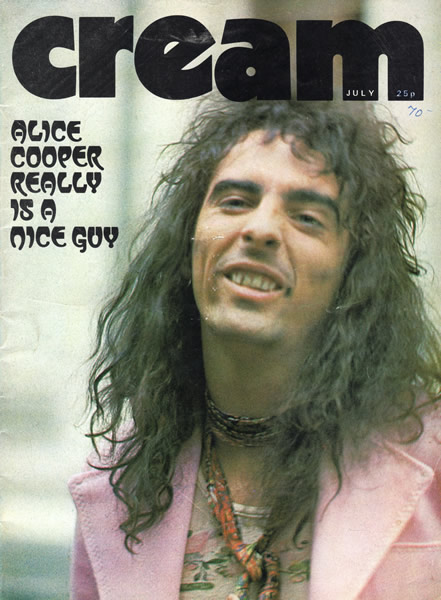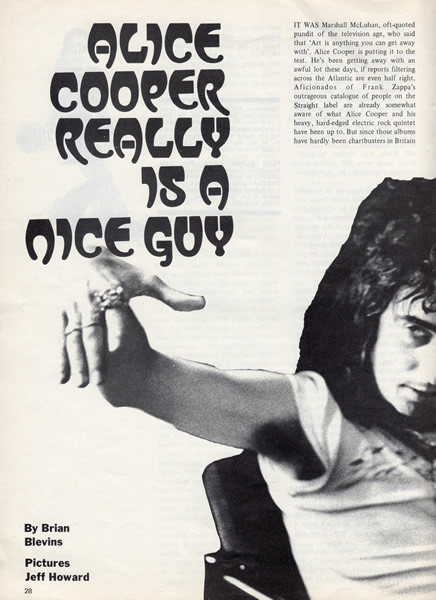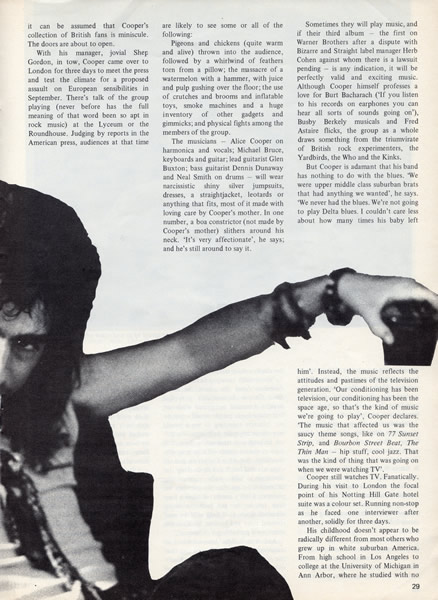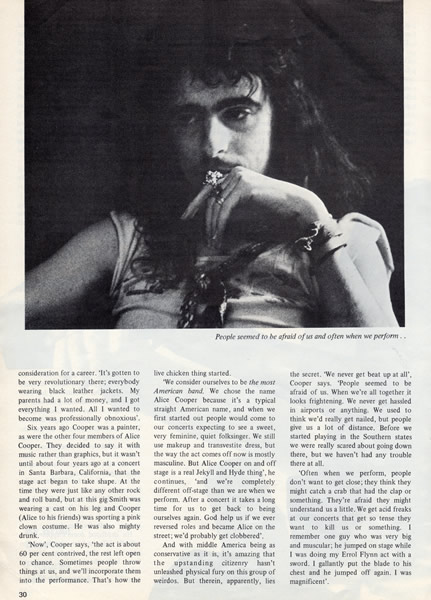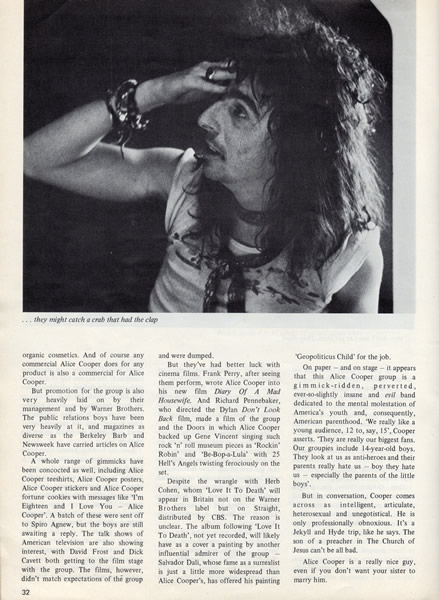Article Database
Alice Cooper Really Is A Nice Guy
It was Marshall McLuhan, oft-quoted pundit of the television age, who said that 'Art is anything you can get away with.' Alice Cooper is putting it to the test. He's been getting away with an awful lot these days, if reports filtering across the Atlantic are even half right. Aficionados of Frank Zappa's outrageous catalogue of people on the Straight label are already somewhat aware of what Alice Cooper and his heavy, hard-edged electric rock quintet have been up to. But since those albums have hardly been chartbusters in Britain it can be assumed that Cooper's collection of British fans is miniscule. The doors are about to open.
With his manager, jovial Shep Gordon, in tow, Cooper came over to London for three days to meet the press and test the climate for a proposed assault on European sensibilities in September. There's talk of the group playing (never before has the full meaning of the word been so apt in rock music) at the Lyceum or the Roundhouse. Judging by reports in the American press, audiences at that time are likely to see some or all of the following:
Pigeons and chickens (quite warm and alive) thrown into the audience, followed by a whirlwind of feathers torn from a pillow; the massacre of a watermelon with a hammer, with juice and pulp gushing over the floor; the use of crutches and brooms and inflatable toys, smoke machines and a huge inventory of other gadgets and gimmicks; and physical fights among the members of the group.
The musicians - Alice Cooper on harmonica and vocals; Michael Bruce, keyboards and guitar; lead guitar Glen Buxton; bass guitarist Dennis Dunaway and Neal Smith on drums - ill wear narcissistic shiny silver jumpsuits, dresses, a straightjacket, leotards or anything that fits, most of it made with loving care by Cooper's mother. In one number, a boa constrictor (not made by Cooper's mother) slithers around his neck. 'It's very affectionate', he says; and he's still around to say it.
Sometimes they will play music, and if their third album - the first one Warner Brothers after a dispute with Bizarre and Straight label manager Herb Cohen against whom there is a lawsuit pending- is any indication, it will be perfectly valid and exciting music. Although Cooper himself professes a love of Burt Bacharach ('If you listen to his records on earphones you can hear all sorts of sounds going on'), Busby Berkley musicals and Fred Astaire flicks, the group as a whole draws something from the triumvirate of British rock experimenters, the Yardbirds, the Who and the Kinks.
But Cooper is adamant that his band has nothing to do with the blues. 'We were upper middle class suburban brats that had anything we wanted', he says. 'We never had the blues. We're not going to play Delta Blues. I couldn't care less about how many times his baby left him'. Instead, the music reflects the attitudes and pastimes of the television generation. 'Our conditioning has been television, our conditioning has been the space age, so that's the kind of music we're going to play', Cooper declares. 'The music that affected us was the saucy theme songs, like on 77 Sunset Strip, and Bourbon Street Beat, The Thin Man - hip stuff, cool jazz. That was the kind of thing that was going on when we were watching TV'.
Cooper still watches TV. Fanatically. During his visit to London the focal point of his Notting Hill Gate hotel suite was a colour set. Running non-stop as he faced on interviewer after another, solidly for three days.
His childhood doesn't appear to be radically different from most others who grew up in white suburban America. From high school in Los Angeles to college at the University of Michigan in Ann Arbor, where he studied with no consideration for a career. 'It's gotten to be very revolutionary there; everybody wearing black leather jackets. My parents had a lot of money, and I got everything I wanted. All I wanted to become was professionally obnoxious '.
Six years ago Cooper was a painter, as were the other four members of Alice Cooper. They decided to say it with music rather than graphics, but it wasn't until about four years ago at a concert in Santa Barbara, California, that the stage act began to take shape. At the time they were just like any other rock and roll band, but at this gig Smith was wearing a cast on his leg and Cooper (Alice to his friends) was sporting a pink clown costume. He was also mighty drunk.
'Now', Cooper says, 'the act is about 60 per cent contrived, the rest left open to chance. Sometimes people throw things at us, and we'll incorporate them into the performance. That's how the live chicken thing started.
'We consider ourselves to be the most American band. We chose the name Alice Cooper because it's a typical straight American name, and when we first started out people would come to our concerts expecting to see a sweet, very feminine, quite folksinger. We still use makeup and transvestite dress, but the way the act comes off now is mostly masculine. But Alice Cooper on and off stage is a real Jekyll and Hyde thing', he continues, 'and we're completely different off-stage than we are when we are performing. After a concert it takes a long time for us to get back to being ourselves again. God help us if we ever reversed roles and became Alice on the street; we'd probably get clobbered'.
And with middle America being as conservative as it is, it's amazing that the upstanding citizenry hasn't unleashed physical fury on this group of weirdos. But therein, apparently, lies the secret. 'We never get beat up at all', Cooper says. 'People seem to be afraid of us. When we're all together it looks frightening. We never get hassled in airports or anything. We used to think we'd get nailed, but people give us a lot of distance. Before we started playing in the Southern states we were really scared about going down there, but we haven't had any trouble there at all.
'Often when we perform, people don't want to get close; they think they might catch a crab that had the clap or something. They're afraid they might understand a little. We get acid freaks at our concerts that get so tense they want to kill us or something. I remember one guy who was very big and muscular; he jumped on stage while I was doing my Errol Flynn act with a sword. I gallantly put the blade to his chest and he jumped off again. I was magnificent'.
Cooper met Zappa through a one-time girlfriend, Lady Christine, who was a member of the GTO's (Girls Together Outrageously), whom Zappa had signed to the Straight label. Zappa then saw Alice Cooper perform at a posthumous Lenny Bruce birthday party held at the Cheetah Club in Los Angeles. 'About half the people walked out on us because they couldn't take all of that at one time. Zappa felt that was a really healthy thing; he liked the negative power of the group'.
Shep Gordon, now the group's manager, was also at the party. 'When I saw 2,000 people walk out on them', he recalls, 'I knew I had to manage them. They exhibit the strongest negative energy force I'd ever seen'.
The polarity of that force now seems to have truly changes. Television still rules American society with its combination of mindless situation comedies, thriller detective and espionage series and the violence or real catastrophes reported on the evening news. The lines of definition between real, the surreal and the fictitious has been dissolved. America's television babies are now relating (there's that word again) to Alice Cooper.
The switch from Straight to Warner Brothers has also had something to do with getting Alice Cooper records into the rock marketplace. Shep Gordon says that the new album, 'Love It To Death', sold two and a half times the number of copies of the two Straight albums combined. A track from the album, 'I'm Eighteen', had been getting AM radio airplay, and 'Love It To Death' made Billboards album chart.
'The public seems to be on to this kind of awareness long before the music business', Shep Gordon reckons. 'After "I'm Eighteen" started to catch on we began to get letters from TV programmes asking us to appear on them. Dick Clarke (host of American Bandstand, the top-ten top of the pops equivalent of American television in the late Fifties which has been revived in the early Seventies), wrote us a letter saying how much he appreciated Alice Cooper over the past couple of years, and could she please appear on his show'.
Even the Madison Avenue advertising boys are catching on to Alice Cooper. A brand of aspirin, Excedrin, has run a lengthy TV campaign over the past few years which depicts various kinds of headaches - 'This is Excedrin Headache Number Three', etc. Alice Cooper filmed a commercial in which they were Excedrin Headache Number 27. But the Excedrin people go cold feet and the ad was never shown. Maybe Alice Cooper proved to be too much of a headache for them.
Now in the wind is a possible advertising endorsement for a brand of organic cosmetics. And of course any commercial Alice Cooper does for any product is also a commercial for Alice Cooper.
But promotion for the group is also very heavily laid on by their management and by Warner Brothers. The public relation boys have been very heavily at it, and magazines as diverse as the Berkley Berb and Newsweek have carried articles on Alice Cooper.
A whole range of gimmicks have been concocted as well, including Cooper teeshirts, Alice Cooper posters, Alice Cooper stickers and Alice Cooper fortune cookies with messages like 'I'm Eighteen and I Love You - Alice Cooper'. A batch of these were sent to Spiro Agnew, but the boys are still awaiting reply. The talk shows of American television are also showing interest, with David Frost and Dick Cavett both getting to film stage with the group. The films, however, didn't match expectations of the group and were dumped.
But they've had better luck with cinema films. Frank Perry, after seeing them perform, wrote Alice Cooper into his new film Diary Of A Mad Housewife. And Richard Penebaker, who directed the Dylan Don't Look Back film, made a film of the group and the Doors in which Alice Cooper backed up Gene Vincent singing such rock 'n' roll museum pieces as 'Rockin' Robin' and 'Be-Bop-a-Lula' with 25 Hell's Angels twisting ferociously on the set.
Despite the wrangle with Herb Cohen, whom 'Love It To Death' will appear in Britain not on the Warner Brothers label but on Straight, distributed by CBS. The reason is unclear. The album following 'Love It To Death', not yet recorded, will likely have as a cover a painting by another influential admirer of the group - Salvador Dali, whose fame as a surrealist is just a little more widespread than Alice Cooper's, has offered his painting 'Geopoliticus Child' for the job.
On paper - and on stage- it appears that this Alice Cooper group is a gimmick-ridden, perverted, ever-so-slightly insane and evil band dedicated to the mental molestation of America's youth and, consequently, American parenthood. 'We really like a young audience, 12 to, say, 15', Cooper asserts. 'They are really our biggest fans. Our groupies include 14-year-old boys. They look at us as anti-heroes and their parents really hate us - boy they hate us - especially the parents of the little boys'.
But in conversation, Cooper comes across as intelligent, articulate, heterosexual and unegotistical. He is only professional obnoxious. It's a Jekyll and Hyde trip, like he says. The son of a preacher in The Church of Jesus can't be all bad.
Alice Cooper is a really nice guy, even if you don't want your sister to marry him.



